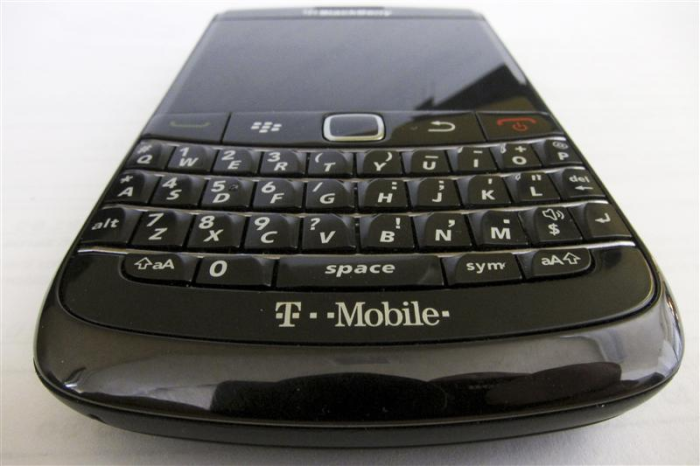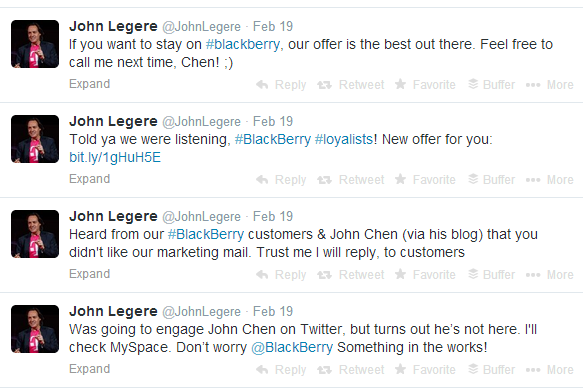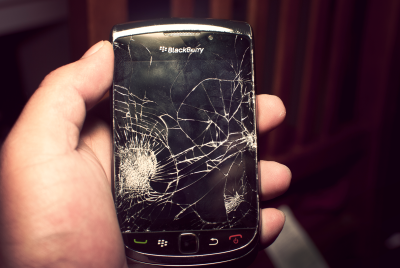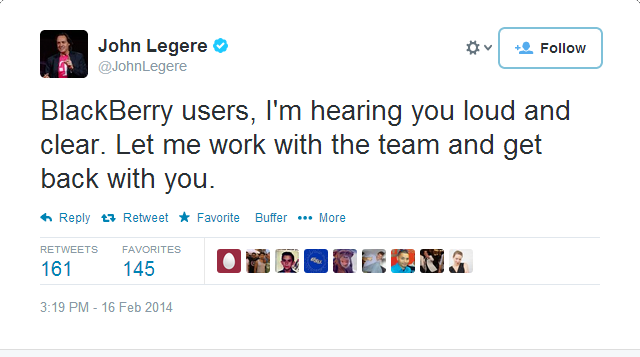
On April 1, 2014, the T-Mobile/BlackBerry debacle officially came to an end. In an announcement on the official BlackBerry Press website, the Canadian phone maker noted that it, “will not renew the T-Mobile U.S., Inc. license to sell BlackBerry products when it expires on April 25, 2014.”1 This marks the end of a bumpy relationship between BlackBerry and the self-proclaimed “UnCarrier,” T-Mobile.
The trouble began in February when T-Mobile began, “pushing the iPhone 5s at $0 down as a “great offer for BlackBerry users.”“2 This offer – perhaps it was more the wording and target of the offer – hit a nerve with both BlackBerry loyalists and John Chen, BlackBerry’s CEO. On 18 February 2014, Chen wrote a heated blog post – at least in terms of a blog post from a CEO – decrying the T-Mobile “Anti-BlackBerry Campaign.” In the post, Chen noted the outrage that long-time BlackBerry users displayed (emphasis added):
I want to thank our loyal customers for your commitment to BlackBerry. By expressing your outrage directly to T-Mobile ?through tweets, calls and comments in the media and on blog posts, you sent a powerful message that T-Mobile could not ignore. Your partnership with our brand is appreciated by all of us at BlackBerry, and draws a sharp contrast with the behavior of our longtime business partner.3
T-Mobile’s CEO, John Legere, no stranger to controversy, took to Twitter:
Then, a few days later, Legere’s Twitter stream:

The new offer, alluded to in Legere’s second Tweet above, directs you to a landing page outlining an offer of “$200 credit toward a new device when you trade in your current BlackBerry and upgrade to one of the latest, greatest devices.”4 This landing page contained some fiery language from Mike Sievert, T-Mobile’s CMO:
Yesterday BlackBerry CEO John Chen posted a blog criticizing T-Mobile’s marketing to BlackBerry users. The premise of his article was that it’s best for customers if we restrict the free flow of information and limit consumer choice. At T-Mobile we totally reject that premise. We believe the best wireless service gives customers complete freedom and choice, and that’s what we are doing with a new offer for BlackBerry users we are announcing today.5
This trade-in deal aimed at appeasing BlackBerry loyalists on the T-Mobile network inadvertently – or perhaps it was the goal, it is hard to say – of causing a mass exodus from the BlackBerry platform. According to a leaked internal T-Mobile document, obtained by TmoNews, “94% of all the people trading in their BlackBerry phones switched to non-BlackBerry devices.”6
On April 1, 2014, the troubled relationship between T-Mobile and BlackBerry came to an end. Without offering much detail on why they chose to end, or rather not renew, their licensing deal with T-Mobile, Chen said in a statement:
BlackBerry has had a positive relationship with T-Mobile for many years. Regretfully, at this time, our strategies are not complementary and we must act in the best interest of our BlackBerry customers. We hope to work with T-Mobile again in the future when our business strategies are aligned.7
- BlackBerry Press Releases, “BLACKBERRY ENDS T-MOBILE U.S. LICENSING AGREEMENT,” Apr 1, 2014 ▲
- Cam Bunton, TmoNews, “Tmo BlackBerry fans not happy with iPhone switch promotion,” 17 February 2014 ▲
- John Chen, Official BlackBerry Blog, “BlackBerry’s Response to T-Mobile’s Anti-BlackBerry Campaign,” 18 February 2014. ▲
- Mike Sievert, T-Mobile Offer Landing Page, “The Un-carrier + BlackBerry = One Sweet Deal.” 19 February 2014 ▲
- Mike Sievert, T-Mobile Offer Landing Page, “The Un-carrier + BlackBerry = One Sweet Deal.” 19 February 2014 ▲
- Cam Bunton, TmoNews, “94% of BlackBerry trade-ins switched to other platforms during promo,” 4 March 2014 ▲
- BlackBerry Press Releases, “BLACKBERRY ENDS T-MOBILE U.S. LICENSING AGREEMENT,” Apr 1, 2014 ▲


